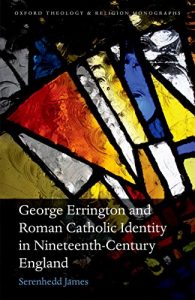The Victorian Archbishop of Trebizond, George Errington (1804-1886) was one of the most prominent figures of nineteenth-century English Roman Catholicism. He was involved in the resurgence of the English Catholic Church, and would have achieved the highest offices himself had not a dispute between him and Cardinal Wiseman led to his fall from favour in the eyes of Propaganda Fide. He has come to be regarded as the leader of an 'Old Catholic' party as the
struggle continued for dominance in the period of consolidation following the restoration of the hierarchy in 1850.
An intimate of Newman, Errington maintained a large correspondence which covers almost every church controversy of his lifetime. His letters shed light on subjects which have long since been dormant and in some cases indicate that the popular interpretations of some affairs are not as clear-cut as has been argued by others. They also expose the various factions in the English Catholic Church at the time, and the slippery nature of the Roman administration. In this comprehensive work, Serenhedd
James explores George Errington's motives and actions, and analyses the forces that were at play in the English Catholic Church of the nineteenth century. James highlights that matters of policy were clouded by issues of personality, and where politicking, as much as prayer, was an integral part of
its way of life.
struggle continued for dominance in the period of consolidation following the restoration of the hierarchy in 1850.
An intimate of Newman, Errington maintained a large correspondence which covers almost every church controversy of his lifetime. His letters shed light on subjects which have long since been dormant and in some cases indicate that the popular interpretations of some affairs are not as clear-cut as has been argued by others. They also expose the various factions in the English Catholic Church at the time, and the slippery nature of the Roman administration. In this comprehensive work, Serenhedd
James explores George Errington's motives and actions, and analyses the forces that were at play in the English Catholic Church of the nineteenth century. James highlights that matters of policy were clouded by issues of personality, and where politicking, as much as prayer, was an integral part of
its way of life.






